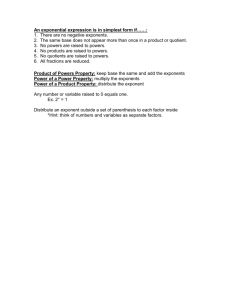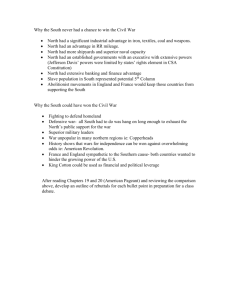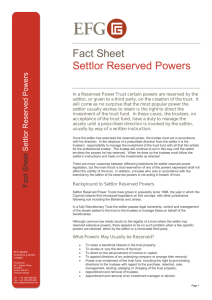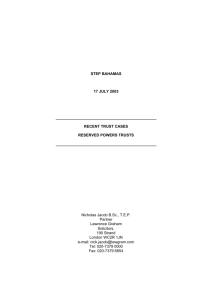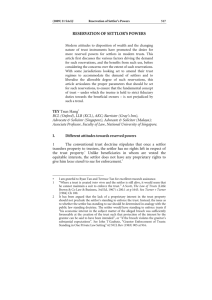Reserved Powers Trusts in the Cayman Islands
advertisement
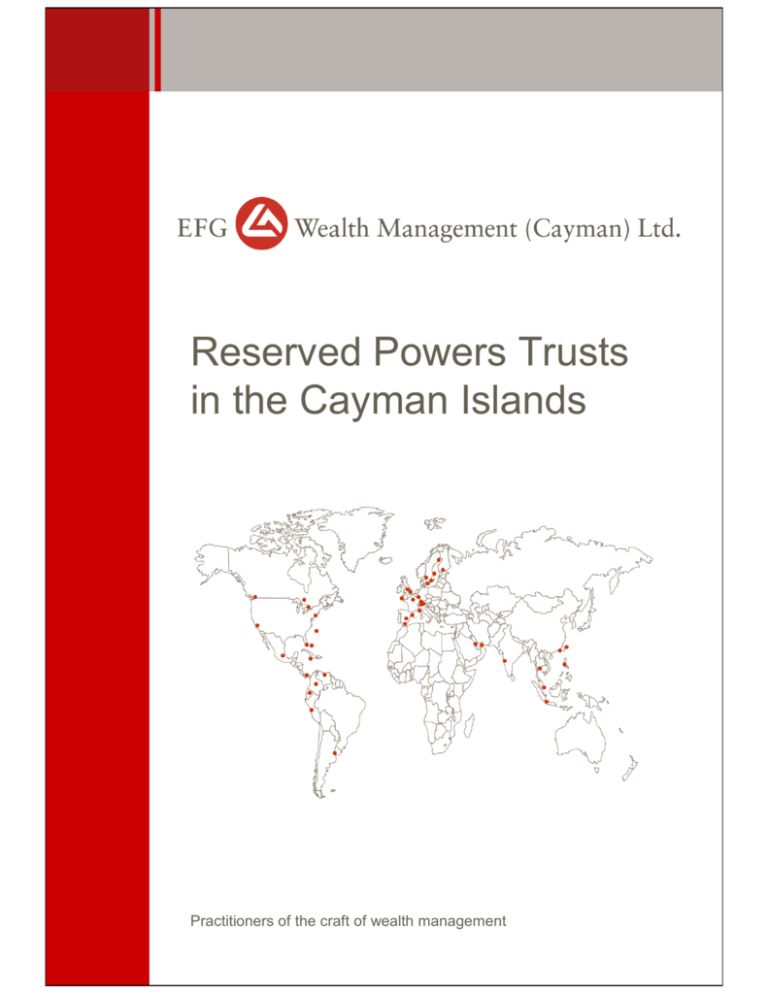
Reserved Powers Trusts in the Cayman Islands Practitioners of the craft of wealth management Background The term ‘Reserved Powers Trust’, whilst not a legal term, describes a trust under which the Settlor has retained one or more powers regarding the trust or the trust property to either direct the Trustees or to restrict the exercise of any discretions vested in them by the trust deed. Under any trust relationship, complete control over the assets must pass to the Trustees, subject only to the terms of the Trust. Great care must be taken when drafting the Trust Deed to ensure that the Settlor does not retain so much power that the Trustees do not in fact have sufficient ‘control’ of the assets for there to be a valid trust relationship. Unfortunately, the issue as to the extent of reserved powers permissible under the common law has been blurred for many years, yet there are dire consequences for overstepping the boundary. The Cayman Islands introduced legislation in 1998 with the intention of bringing greater clarity to the common law position by specifically stating which powers could be reserved by the Settlor without affecting the validity of a Trust governed by the laws of the Cayman Islands. What powers can be reserved under the Trust Deed? The Trusts Law brings certainty to the common law position by providing a prescriptive list of powers, any or all of which may be reserved by the Settlor (or exercisable by any other individual), without impacting upon the validity of a trust governed by Cayman law. These powers are: Power to revoke, vary or amend the trust instrument in whole or in part Power to appoint either income or capital of the trust property Power to retain any limited beneficial interest in the trust property Power to act as a director or officer of any company wholly or partly owned by the trust Power to give binding directions to the trustee in connection with the purchase, holding or sale of the trust property Power to appoint, add or remove any trustee, protector or beneficiary Power to change the governing law and the forum for administration of the trust; or Power to restrict the exercise of any powers or discretions of the trustee by requiring that they shall only be exercisable with the consent of the settlor (or any other specified person) What are the advantages of Reserved Powers Trusts? The main advantage from the Settlor’s perspective is that it allows a degree of control to be maintained over the management of the assets. Reserved Powers Trusts are popular with Settlors from civil law countries who are reluctant to transfer full control to offshore institutional trustees, and also with individuals for whom the primary objectives of the trust are neither mitigating tax nor asset protection. Advantages of Reserved Powers Trusts (cont.) Some examples of where a reserved powers trust can provide an advantage over other types of trusts: To retain investment powers where the Settlor has more experience than the Trustee in choosing investments, or wishes to pursue an investment strategy that the Trustees may not consider to be in the best interests of the beneficiaries. To act as a director of an investment holding company (e.g. for a family business, etc) held by the trust where the Settlor wishes to utilise personal knowledge and experience that the trustees do not have in making decisions. To retain flexibility to control the dispositive provisions of the trust to meet changing circumstances, by retaining power to benefit (or not benefit) particular beneficiaries, or to add or remove beneficiaries, as the Settlor thinks fit. To remove the Trustee without cause and appoint new Trustees in the event of a dispute, rather than having to rely on the limited statutory provisions to remove a trustee. What are the risks of Reserved Power Trusts? The legislation provides welcome clarity and significantly reduces the risk of Cayman trusts being set aside although, as with any other jurisdiction, the risk cannot be eliminated entirely. Given the broad scope of the powers identified in the law, in the unlikely event that the Trust attempts to reserve powers beyond those listed, the courts may strike down the offending provision, or at worst, set aside the whole trust. There may also be onshore tax or legal consequences that may arise from the reservation of any powers under the Trust. For example, if asset protection is a primary objective of the trust, ideally no powers should be reserved to avoid the risk of onshore courts ordering the Settlor to exercise those powers in such a way so as to bring assets onshore, or to use those powers adversely. Likewise, the reservation of investment powers by the Settlor may have adverse tax consequences. It may be possible to reduce these risks to an extent by ensuring any reserved powers are restricted to powers to veto certain Trustee decisions, rather than positive powers compelling the Trustees to act in a particular way. It is important to obtain professional onshore tax and legal advice before the Trust is created to ensure it achieves the desired objectives. How can a Reserved Powers Trust be created? What are the risks of Reserved Power Trusts? Great care needs to be taken in both setting up and administering a Reserved Powers Trust to avoid any adverse consequences. EFG Wealth Management (Cayman) Ltd has extensive experience in dealing with such structures, and can liaise with both onshore and offshore counsel to both meet the objectives of the Settlor whilst minimising the risks. Contact information For further information, please contact Simon Nock by telephone on +1 (345) 815 0309 or by e-mail at simon.nock@efgbank.com. Practitioners of the craft of wealth management EFG Wealth Management (Cayman) Ltd, 1st Floor, Strathvale House, 90 North Church Street, Grand Cayman KY1-1003 Tel +1 345 943 3350


